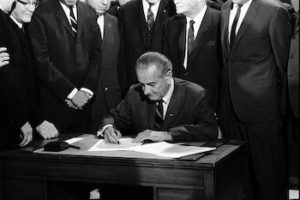
President Johnson signing
*On this date in 1968, the Civil Rights Act of 1968 was signed. This federal law prohibited discrimination concerning the sale, rental, and financing of housing. President Lyndon Johnson signed this landmark act into law almost immediately following the Martin Luther King assassination riots in America.
It was the final primary legislation passed in the modern 20th-century American Civil Rights Movement. This Act attempted to create equality in the United States and was signed during the Martin Luther King assassination riots. Titles II through VII comprise the Indian Civil Rights Act, which applies to the Native American tribes of the United States and makes many but not all the guarantees of the U.S. Bill of Rights applicable to them. (That Act appears today in Title 25, sections 1301 to 1303 of the United States Code).
Titles VIII and IX are commonly known as the Fair Housing Act, which was a follow-up to the Civil Rights Act of 1964 (this is different legislation than the Housing and Urban Development Act of 1968, which expanded housing funding programs). While the Civil Rights Act of 1866 prohibited discrimination in housing, no federal enforcement provisions existed. The 1968 act raised on previous actions and prohibited discrimination concerning the sale, rental, and financing of housing based on race, religion, national origin, and, since 1974, sex.
Since 1988, the Act has protected people with disabilities and families with children. Pregnant women are also protected from illegal discrimination because they have been given familial status, with their unborn child being the other family member. Victims of discrimination may use both the 1968 Act and the 1866 Act's section 1983 to seek redress. The 1968 Act provides federal solutions, while the 1866 Act provides private solutions (i.e., civil suits). The Act also made it a federal crime to "by force or by threat of force, injure, intimidate, or interfere with anyone because of their race, color, religion, or national origin, handicap or familial status." The Civil Rights Act of 1968 prohibited the following forms of housing discrimination:
· Refusal to sell or rent a dwelling to any person because of race, color, religion, or national origin. Discrimination based on sex was added in 1974, and people with disabilities and families with children were added to the list of protected classes in 1988.
· Discrimination against a person in the terms, conditions, or privilege of the sale or rental of a dwelling.
· Advertising the sale or rental of a dwelling indicating preference of discrimination based on race, color, religion, or national origin. This provision was also amended to include sex, disability, and having children.
· Coercing, threatening, intimidating, or interfering with a person's enjoyment or exercise of housing rights based on discriminatory reasons or retaliating against a person or organization that aids or encourages the exercise or enjoyment of [fair housing] rights.
· Neglecting maintenance and repairs of the units rented by people based on race, religion, sex, or any other discriminatory demographic.
· Restricting access to services and amenities based on the renter's race, gender, religion, or nationality.
In 2012, the United States Department of Housing and Urban Development's Office of Fair Housing and Equal Opportunity issued a regulation prohibiting LGBT discrimination in federally assisted housing programs. The Supreme Court ruled in 2020 that discrimination based on "sex" includes discrimination based on sexual orientation and gender identity. It was in February 2021 that Housing and Urban Development issued a rule change under President Joe Biden to implement this decision. In addition, many states, cities, and towns have passed laws prohibiting discrimination in housing based on sexual orientation and gender identity.
According to HUD, an estimated 2 million housing discrimination cases occur yearly. The National Fair Housing Alliance, the largest fair housing non-profit in the country, estimates that number to be closer to 4 million per year, excluding instances of discrimination due to disability or familial status. Housing projects have also come under fire from researchers and NGOs alike.